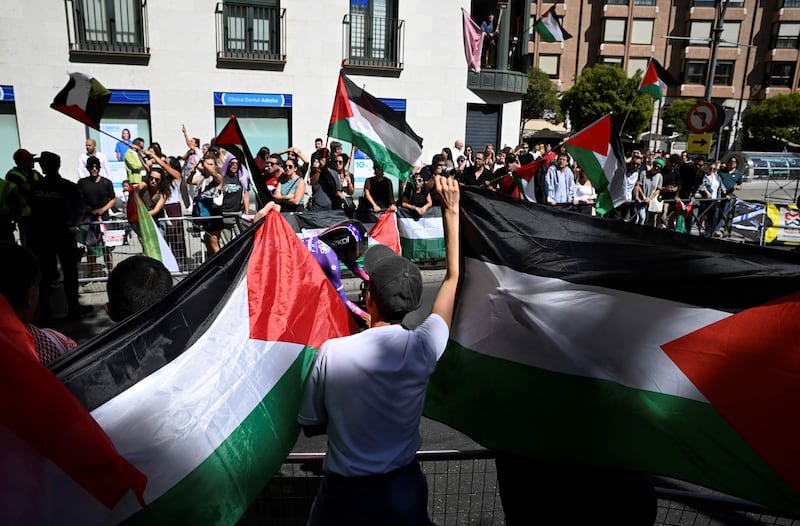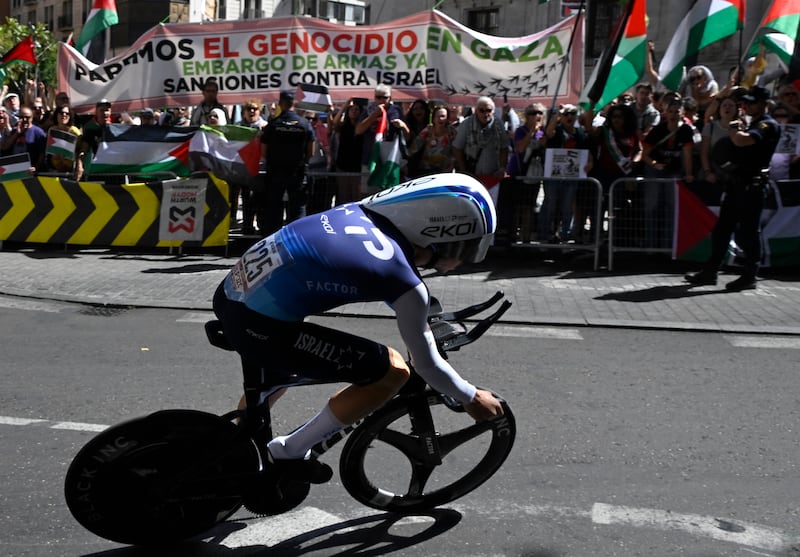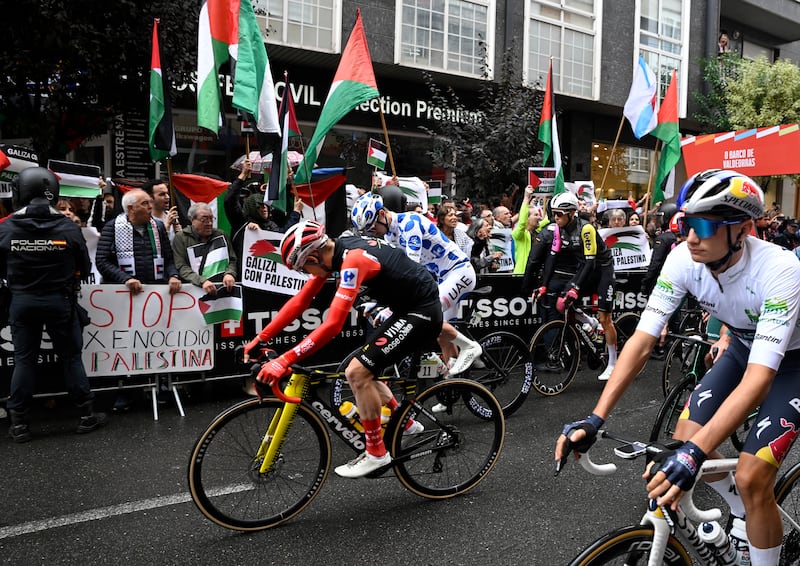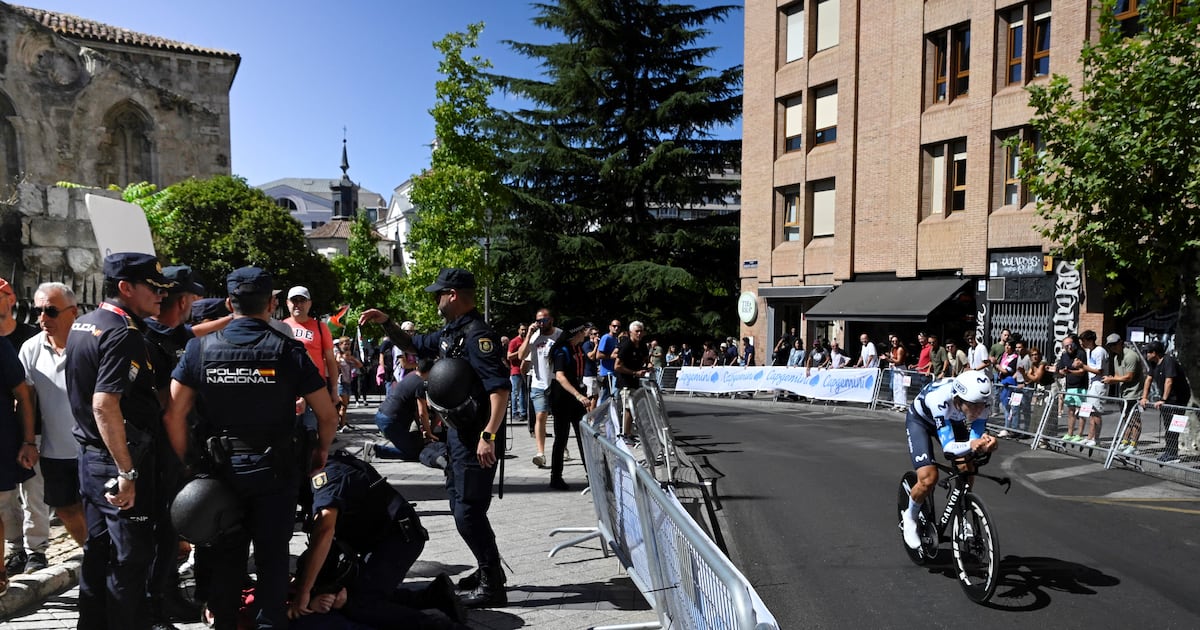The Spanish Vuelta cycling race enters Madrid this weekend for its finale accompanied by an unprecedented security deployment over fears it will be disrupted by pro-Palestinian protesters.
Up to 1,500 police will be on duty for the last two stages of this year’s race, which begin in the mountains west of the capital on Saturday before culminating in central Madrid on Sunday.
The Vuelta is one of a trio of prestigious three-week European road races, along with the Tour de France and the Italian Giro. But this year it has been overshadowed, and at times interrupted, by demonstrations in favour of the Palestinian people and against the involvement in the race of an Israeli team, Israel-Premier Tech.
During the 11th stage, as it passed through the Basque city of Bilbao, stewards struggled to prevent protesters waving Palestinian flags from collapsing the barricades lining the route. The stage was suspended several kilometres before the finish line and no winner was declared. Last Sunday there were 10 arrests as the race went through Lugo, in Galicia, and two cyclists fell after colliding with a protester.
The Spanish rider Javier Romo had to abandon the Vuelta because of his injuries.
“We are offering a sporting show and we should be an example for youngsters, but in the end another image is being given,” he said.
 Pro-Palestinians protesters demonstrate as cyclists compete during the Vuelta a Espana. Photograph: Miguel Riopa/AFP via Getty Images
Pro-Palestinians protesters demonstrate as cyclists compete during the Vuelta a Espana. Photograph: Miguel Riopa/AFP via Getty Images
Protesters have hacked the Vuelta’s official radio channel to broadcast pro-Palestinian slogans. Tuesday’s stage in Pontevedra, Galicia, was also curtailed due to security concerns.
“It’s a shame this has happened again,” said the Danish leader of the race, Jonas Vingegaard. “Everyone has a right to protest, but it’s a shame that it has to happen here and in this way and that we can’t finish the race.”
[ Spain’s Basque bullfighting tradition faces growing oppositionOpens in new window ]
The Israel-Premier Tech team, whose members have had police escorts during the race, has refused to withdraw. However, it has removed the word “Israel” from its riders’ shirts, citing “the dangerous nature of some protests”. The team is owned by Canadian-Israeli Sylvan Adams, a close friend of Israeli prime minister Binyamin Netanyahu.
After the shirt redesign announcement, Netanyahu praised Sylvan and the team “for not giving in to hate and intimidation”, adding: “You make Israel proud!”
 Protesters wave Palestinian flags as Israel Premier Tech’s rider Nadav Raisberg competes during the Vuelta. Photograph: Miguel Riopa/AFP via Getty Images
Protesters wave Palestinian flags as Israel Premier Tech’s rider Nadav Raisberg competes during the Vuelta. Photograph: Miguel Riopa/AFP via Getty Images
Meanwhile, a Spanish judge has opened a preliminary investigation into whether hate crime charges can be brought against protesters.
There are concerns that this weekend’s final stages could face severe disturbances. The police deployment will be the largest Madrid has seen since the Nato summit in the Spanish capital in 2022 and the local and central governments appear to be preparing for the worst.
“Citizens have the right to protest, but that has to comply with security and not put at risk the safety of the cyclists or those who come to see them,” said interior minister Fernando Grande-Marlaska.
The cyclists appear to have been unsettled by the protests, with demonstrators reportedly throwing broken glass and nails at some riders.
Iker Camaño, of the Spanish Association of Professional Cyclists, said competitors “are very afraid”, adding that “it’s difficult to ride like this because they are alert to what is happening away from the race”.
The backdrop to the drama of the Vuelta is an international dispute being played out between the left-wing Spanish government and Israel.
 Protesters wave Palestinian flags as riders take the start of the 17th stage of the Vuelta a Espana. Photograph: Miguel Riopa/AFP via Getty Images
Protesters wave Palestinian flags as riders take the start of the 17th stage of the Vuelta a Espana. Photograph: Miguel Riopa/AFP via Getty Images
Earlier this month Spanish foreign minister José Manuel Albares said he believed Israel-Premier Tech should be barred from the Vuelta because of Israel’s actions in Gaza. On Monday the prime minister, Pedro Sánchez, announced a series of measures his administration is taking against Israel for the “genocide” it is committing.
“The Spanish government believes that it is one thing to protect your country and quite another to bomb hospitals and kill innocent boys and girls through hunger,” he said. “That is not defending yourself, it’s not even attacking. It is exterminating a defenceless people.”
Sánchez is one of Europe’s more outspoken voices in criticising Israel and last year Spain, alongside Ireland and Norway, acknowledged a Palestinian state, drawing a fierce response from Tel Aviv. His latest initiative, which includes a weapons embargo, led to Israel barring two Spanish government ministers from the country. Madrid immediately responded by barring two Israeli ministers.
Spanish public opinion appears to support Sánchez on this issue. Eighty-two per cent of Spaniards believe Israel is committing genocide, a recent poll by the Royal Elcano Institute think tank revealed, up from 71 per cent a year earlier.
[ How wildfires in Spain consumed ‘heroes’ who rushed to helpOpens in new window ]
While the government has presented a united front on the Gaza issue and the Vuelta race, the opposition has been more ambiguous. The leader of the conservative People’s Party (PP), Alberto Núñez Feijóo, has described Israel’s actions in Gaza as “unacceptable” but he has not used the word “genocide”.
However, his party colleague, Isabel Díaz Ayuso, the hard-line president of the Madrid region, has stridently supported Israel and has expressed no tolerance for those protesting during the cycling race.
“The athletes’ lives are under attack and freedom is being halted,” she said. “[The protests] are not about Gaza. They are trying to destroy the image of Spain in the eyes of the world.”
